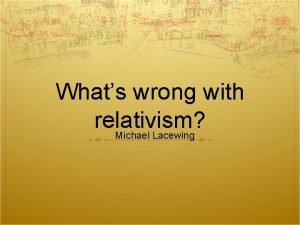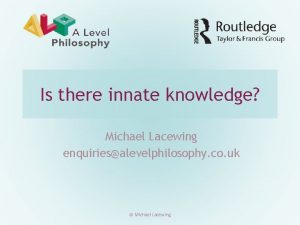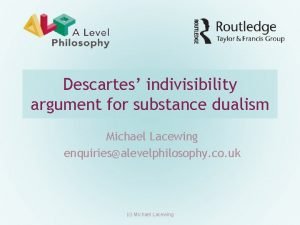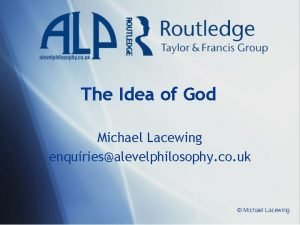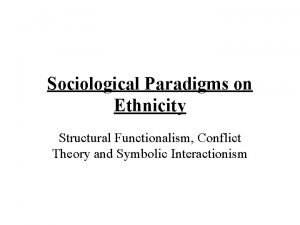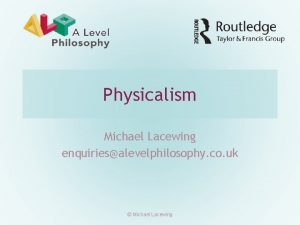Functionalism Michael Lacewing enquiriesalevelphilosophy co uk Michael Lacewing







- Slides: 7

Functionalism Michael Lacewing enquiries@alevelphilosophy. co. uk © Michael Lacewing

Metaphysics of mind • What exists? • Does the mind exist as a substance? – Can it exist independently, or does it depend on something physical to exist? • Substance dualism: two types of substances exist – mental and physical • Physicalism: only physical substance exists, and everything that exists depends on physical substance and properties • Functionalism: we can understand the mind and mental states without making any claims about what substances exist © Michael Lacewing

Functionalism • Mental states and properties are ‘functional’ states and properties • Each mental state is a disposition to behave in particular ways and have certain other mental states, given certain inputs from the senses and certain other mental states – Different mental states differ in their typical inputs and outputs • The complete description of the mental state’s outputs, for each possible set of inputs, is the description of its function © Michael Lacewing

Causal role functionalism • Causal role functionalism understands the relation between inputs, the state, and outputs causally • Many things can be understood in terms of fulfilling a causal functional role – e. g. being an eye, being a poison, being a carburettor • The same is true of mental states, e. g. what it is to be a belief, desire, pain, etc. © Michael Lacewing

Computational functionalism • ‘Function’ as instructions for computers (Putnam, ‘The nature of mental states’) – Described by a ‘machine table’: a complete list of descriptions of the form ‘if the machine is in state S 1 and receives input I 1, then it produces output O 1 and goes into state S 2’ – for every possible input + state combination, an output is assigned – E. g. a drinks dispenser • Mental states are machine table states – For each possible input, they produce a particular output © Michael Lacewing

Multiple realisability • Any organism that has functional states must have a complex internal organisation – E. g. if the functional state is defined by what causes it and what it causes, then there must be some inner state that has these causal powers – If the state is defined by a machine table, there must be distinct states that move between inputs and outputs in the way described • I. e. inner states are needed to ‘realise’ the functional state • The nature of inner state doesn’t matter, as long as it realises the function – E. g. Different structures of eyes, different chemicals are poisons © Michael Lacewing

Multiple realisability • All of this applies to mental states (as functional states) – Different kinds of creature can have mental states – It doesn’t even matter whether it is physical or mental substance! • Mental properties can’t be identical to physical properties, because beings with different physical properties (e. g. different kinds of brain) could nevertheless have the same mental properties – E. g. pain in different species – What brains are made of is not relevant – it is what they can do that matters • So mental properties are ‘multiply realisable’ © Michael Lacewing
